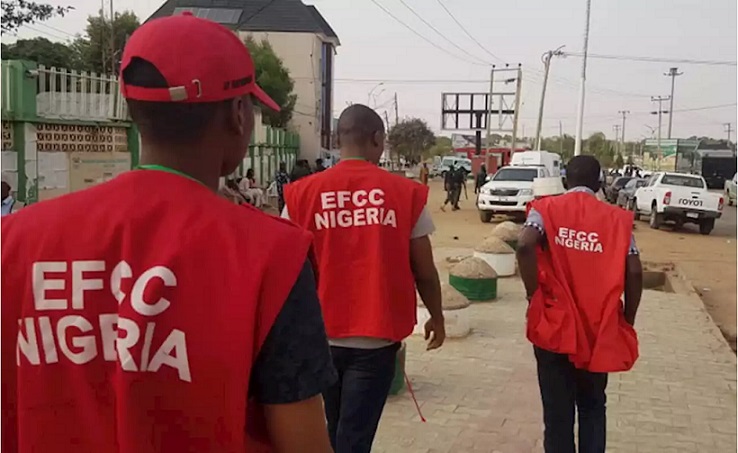Make whistle-blower policy work
The complaint by the Economic and Financial Crimes Commission (EFCC) that Nigerians were scarcely coming forward with information about corruption and wrong-doing under the whistle-blowing policy came as a shock to Nigerians. A whistle-blower is entitled to as much as 2.25 per cent of any sum recovered as a direct consequence of intelligence information about […]

The complaint by the Economic and Financial Crimes Commission (EFCC) that Nigerians were scarcely coming forward with information about corruption and wrong-doing under the whistle-blowing policy came as a shock to Nigerians. A whistle-blower is entitled to as much as 2.25 per cent of any sum recovered as a direct consequence of intelligence information about corrupt government officials given to the EFCC and other anti-graft agencies. However, Mr Osita Nwaja, the Director of Public Affairs, who spoke recently on behalf of Abdullahi Bawa, the chairman of the organisation, expressed concern that Nigerians were no longer coming forward with tip-offs about stolen funds or corrupt practices.
The EFCC official revealed this during a one-day town hall meeting on strengthening the capacity of stakeholders on the whistle-blowing policy, held in Ilorin, Kwara State. Nwajah told the town hall meeting that, “Two of the landmark recoveries from whistle-blowers’ information were the $9.8m recovered from a former managing director of the Nigerian National Petroleum Corporation, Mr Andrew Yakubu, and the $11 million recovered at an apartment in Osborne Towers, Ikoyi, Lagos. This seeming loss of interest is difficult to explain given that those who initially embraced the policy were rewarded… [There is need] for fresh awakening to sustain the flow of critical intelligence to the law enforcement agencies.”
- Burna boy assures fans of daily teasers till new album release
- Police debunk terrorist attack on Anambra church
This development is an anti-climax in the anti-corruption fight because, as at 2017, former Finance Minister Kemi Adeosun had told Nigerians excitedly that many Nigerians were coming forward with information about acts of corruption, which helped government to recover diverse sums of money. She said, “We have over 2,500 tips from various quarters. Not just the big money that you all see in the papers, but a lot of these small monies. Somebody diverting the petty cash for the university, we were able to get in there and stop him…” At inception, the policy, as envisioned by the Federal Ministry of Finance, was designed to encourage anyone with information about a violation of financial regulations, mismanagement of public funds and assets, financial malpractice, fraud and theft, to report it. It included fraudulent and unapproved payments; and procurement fraud (notably, kickbacks and over invoicing).
However, the implementation of the policy threw up a lot of unethical practices which might have killed the spirit of whistle-blowers. An investigation published by Daily Trust on Sunday in December 2021 revealed that those who provided intelligence information were made to pass through a tedious and discouraging documentation process. One whistle-blower interviewed in the story lamented thus: “They (EFCC) will subject you to many things. The statement they will ask you to write is like you are a criminal. No one can pass that process and would want to go back there with any information.” Without any genuine legal protection, some whistle-blowers suffered backlashes, like intimidation from the management of government agencies, physical assault, diverse kinds of threats, while some were sacked for giving anti-graft agencies intelligence information. Some whistle-blowers complained that after asset and financial recoveries were made, anti-graft agencies failed to remit to them the exact amount they ought to receive based on the 2.25 per cent ‘commission’ advertised by the Ministry of Finance. To add to these disappointments was a threat by the EFCC that any whistle-blower who provided false information would be prosecuted. Under this risky atmosphere, only very few persons would provide the EFCC with intelligence information.
All over the world, corruption is fought through whistle-blowing, but the success of the policy would require a lot of political will. In June this year, the British Broadcasting Corporation (BBC) exposed the gaps and failure of the policy at the United Nations, where those who reported sexual assaults and corruption were either victimised or abandoned to their fate. But that does not mean if an honest system is put in place, the policy would not work. Modern technology that could grant anonymity to whistle-blowers has to be deployed. In some institutions, documents supporting allegations of fraud are uploaded on portals, leaving little digital footprint of the whistle-blower. This would allow anti-graft agencies to investigate allegations independently without exposing the whistle-blower. We call on government and EFCC to look in that direction in order to reignite interest in the whistle-blowing policy.
Furthermore, government must enact a whistle-blowing law that takes care of the challenges faced by anti-graft agencies and whistle-blowers. Since 2017, the National Assembly and some Civil Society Organisations have come up with relevant draft bills, but none has been passed into law. The multiple bills should be harmonised and passed into a law that should be signed by President Muhammadu Buhari before the end of his administration in 2023. It is noteworthy that the whistle-blowing policy is part of the administration’s strategies for entrenching transparency and accountability in governance. Now it needs concrete legal backing. Most importantly, the EFCC must put its house in order, if it wants Nigerians to provide intelligence information to be used to recover looted funds.
